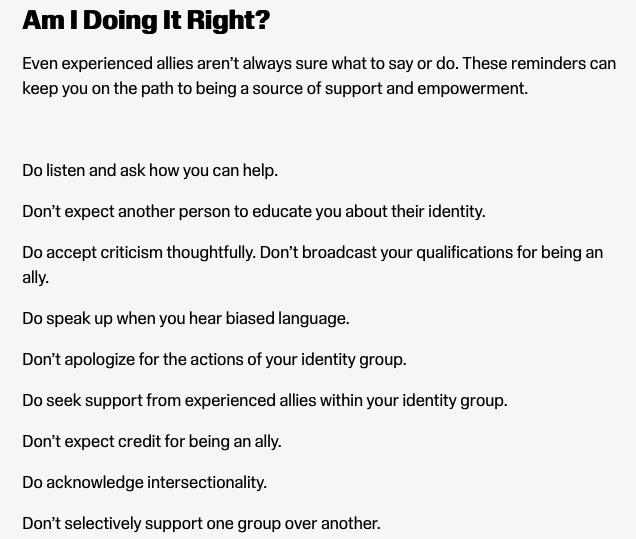– Kevin Prince Boateng
In this module, we focus on how allyship is like being a good teammate. It means we show up and speak up for others – in overt situations of prejudice and in everyday interactions. You will reflect on how allyship is present in your life right now, and how we can all better understand and support the needs of others. Finally, you will practice taking action to grow your team of allies.
Picture an injury on the field. What happens? The trainer or the coach runs out at top speed. The game stops, the players wait. The needs of the injured player take precedence over the game. If the player needs help off of the field, they can count on their teammates to physically assist them. Once they have been taken care of, the game can resume. Allyship is a lot like listening to the injured player. We didn’t have the experience of the collision or the fall. We trust the player to tell us where it hurts, what happened, and what it felt like. Based on their word, the initial treatment plan is formed.
To practice anti-racist coaching, it takes this same amount of listening, and a willingness to engage in issues of unfairness and injustice. We must strengthen our allyship and create avenues for our teams to take collective action against individual, interpersonal, and systemic racism.
Allyship, like being a good teammate, means we show up and speak up for others
Genuine allyship requires that we see, hear and support the needs of others
We must reach out to others to grow our team of allies because it takes all of us to make lasting change
Anatomy of an Ally from Learning for Justice aims to support educators to navigate the complexities of allyship in and out of the classroom, supporting individuals to learn about what it takes to become an effective ally, and to examine their own intentions, commitment, and identities as a part of that process.
The Toolkit for Anatomy of an Ally addresses the complex and challenging work of being an ally and presents a framework for helping social justice educators think about their own ally identity development. It names three different models for being an ally – Self-Interest, Altruism, and Social Justice – supporting individuals on their journey to becoming an ally for social justice.
Toolkit for for "Anatomy of an Ally"
